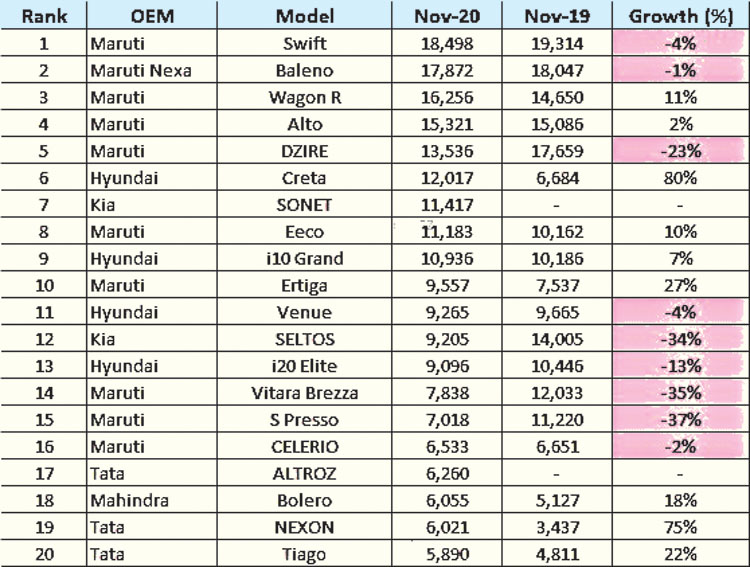Top 20 models drive over 74% of India’s car sales in Apr-Nov, up from 70% in 2015-16-Business Journal
Chennai, Jan 5 (Agency) Two consecutive years of low sales, first due to an economic slowdown and then the pandemic, has created a ‘winner takes it all’ situation in the car and SUV market. The top 20 models sold between April and November comprise 74.1% of all passenger vehicle sales in India, up from 70% in 2015-16 and 69% in 2016-17. In 2017-18, the top 20 passenger vehicles commanded 69.4% of the market, which increased to 72% in 2018-19 and hit 73% in 2019-20.

“When consumption is under pressure, customers tend to experiment less and go with established brands and models, which explains this phenomenon,” said Maruti Suzuki executive director Shashank Srivastava. Hyundai Motor India director (sales, marketing & service) Tarun Garg said: “Last couple of years have been very challenging and during uncertain times customers’ affinity is more towards tried, tested and strong brands as they give confidence to customers.” Interestingly, the contribution of the top 10 models has not varied much, remaining between 48-49%. It was 49% in 2019-20 and dipped to 48.7% in the April-November period this year. Maruti Suzuki’s Swift, which ousted stablemate Alto 800 to become India’s largest selling passenger vehicle in 2019-20 has continued to hold its position even as due to market contraction actual volumes of this model too has come down from a peak of 2.2 lakh units in 2018-19 to 1.9 lakh units last year and 95,500 units in April-November 2020. Swift’s contribution to the total industry sales has gone up from 5.7% in 2016-17 to 5.8% in 2017-18, 6.6% in 2018-19, 6.8% in 2019 and 6.6% in April-November 2020. The Swift’s race to the top of the pile has been powered by first-time car owners, who now comprise 46% of its buyers, up from 36% five years ago. But Alto 800 still commands more first-timers with 58%.
Auto consultants say the winner-takes-all trend has been visible in many consumer sectors as well. “Over the last decade, there has been a proliferation in variants and brands but a deep understanding of consumer preferences, buyer attributes and ability to consistently develop relevant product value propositions have benefited larger brands. A more recent phenomenon is for consumers to go back to trusted products which is true across other industries like consumer goods too,” said Vinay Raghunath, head (auto sector), EY.

